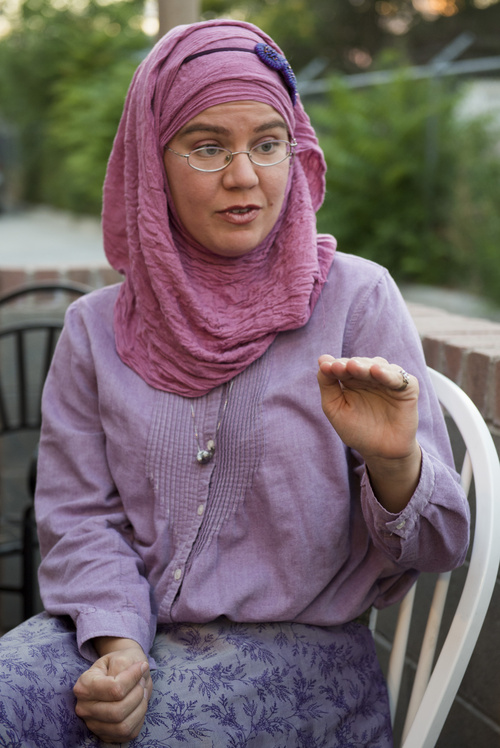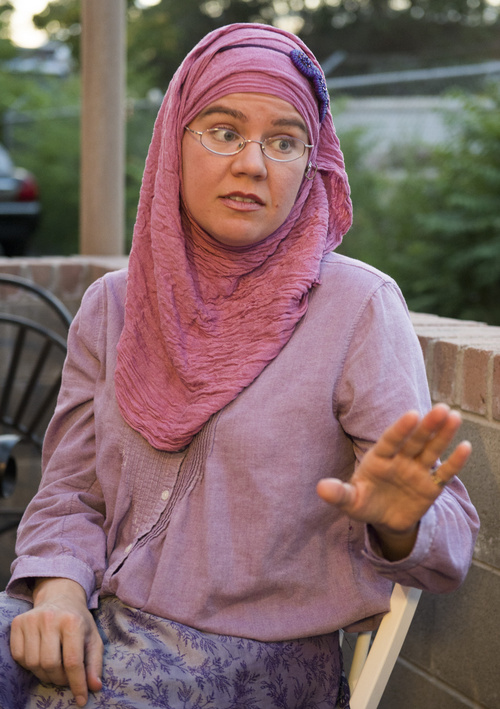This is an archived article that was published on sltrib.com in 2014, and information in the article may be outdated. It is provided only for personal research purposes and may not be reprinted.
They regularly declare their faith in Allah as God and Muhammad as his prophet. They pray five times a day. They give to the poor. They travel at least once in their lives to Mecca.
And, like more than a billion Muslims worldwide, they have been fasting from sunup to sundown for a monthlong religious obligation known as Ramadan.
But these Utah believers — as converts, women, Americans or gays — sometimes feel like outsiders in their own faith.
"We pray alone, fast alone and worship alone," says Chiloh Harville. "Going to the mosque is kind of like going to the school cafeteria and not being one of the cool kids. People tend to separate along cultural or ethnic lines — and leave us out."
She chose the faith, says Harville, an American convert, not the culture of Pakistan, India, Indonesia, Lebanon, Iraq, Iran, Somalia, Bosnia or any other Arab, African or Asian nation.
"The five pillars of Islam are what make you Muslim," she says. "Everything else is window dressing."
So now Harville and others have formed an open and inclusive Muslim group to provide social support to one another — and they are looking for a place to hold regular meetings.
At first, they considered joining a national organization, Muslims for Progressive Values, but that group was "too out there," says Angela ElSayed, also a convert but married to a lifelong Muslim, Mohamed ElSayed. "We wanted to stay closer to Islam."
Then they weighed starting their own mosque, but found such an undertaking too arduous. So they settled on a social connection and a lively Facebook page under the temporary name "Al-Farah Muslims," with nearly 100 participants.
Their purpose, they wrote on their page, is to be open to "all individuals that identify themselves as Muslims regardless of gender, lifestyle, economic or educational background, sexual orientation, race, nationality or affiliation with any sector subgroup of Islam," and "to conduct activities in a way that is in keeping with Islamic principles of mercy, justice, charity and intellectual achievement."
Angela ElSayed wears her hijab, or head covering, only during worship at the mosque, rather than all the time, which has opened her up to criticism from more religiously observant women. And she doesn't like men and women being separated by a wall or in a different spaces during prayers.
"In the Prophet Mohammad's time, women prayed behind the men," she says, "not behind a barrier."
Until three months ago, Shareen Kayyali, a Palestinian Muslim, hadn't been to a mosque since she moved to Utah in 2007.
"I feel judged at a regular mosque, because I don't wear hijab," says Kayyali, who studies international relations at the University of Utah. "But I don't feel any less religious without it [head covering]."
That's why Kayyali has embraced this new group.
"There should be a space for anyone who wants to come and worship with us," she says. "What we do should be between us and God. Islam is about what is in your heart, not what you are wearing."
Christine Hadlocke believed she had lost her identity when she married a Kurdish man.
"I agree with the need for modesty, but he wouldn't even let our four daughters go swimming, not even in our backyard," Hadlocke says. "He insisted that I come home before dark and all our friends were his friends. I was not allowed any of my own. I was under his thumb."
Shortly after the two wed, her husband's mother moved in and took over, picking furniture for the house and deciding everything that went on.
"His mother did everything for him," Hadlocke says. "He said it was the Kurdish way."
She divorced her husband three years ago, but continues to follow Islam and rear her daughters in the faith.
Hadlocke finds solace in this new group's blend of believers, who are "a lot more accepting of each other."
Glen Sexton, a divorced father of seven, began studying Islam in 2009, while still living as a Mormon. He read the entire Quran and found in it "answers to questions I had my whole life."
Sexton, who had served in three LDS bishoprics (local lay leadership), soon started attending the Khadeeja Islamic Center in West Valley City and two years later made a formal declaration of faith.
But that mosque had little interest in converts, Sexton says. "There were no Quran classes or discussions where a new member could ask questions."
Plus, it was dominated by believers from a single region.
"I thought you had to be Pakistani," Sexton says, "to enter through the door on the west side."
So he switched to Sandy's Utah Islamic Center, where Imam Shuaib Din encouraged study and questions.
The south valley center is more inclusive, the convert says, but stills falls short with some unconventional Muslims.
On the question of homosexuality, for instance, the mosque aligns closely with conservative Christianity.
"We follow the 'hate-the-sin-but-not-the-sinner' model," Din says. "Homosexuality goes totally against the teachings of the Quran and our sunnah, the prophet's words. What's wrong is wrong, but we welcome gays as our brothers in faith."
For American Muslims, Din says, "the gay issue is probably where it was 30 years ago in America. If someone is gay, he would definitely not come out of the closet in our community."
So far, to Din's knowledge, no one in his mosque has.
Angela ElSayed believes Din means well, but she has heard too many stories of shunning and exclusion.
Two years ago, she was an Islamic representative to a Pride interfaith program.
"I heard [gays] say they felt they didn't have a right to worship God or to love God because they were homosexual — and that was bad," ElSayed says. "I couldn't even imagine thinking that you don't have a right to a relationship with God."
She and the others want members of their group to feel safe for all kinds of Muslims, wherever they are on their spiritual journeys.
We want to be "who we are," ElSayed says, "and still be Muslim."
And they don't want anyone to be sitting alone in the lunchroom of faith.
Twitter:@religiongal —
Five pillars of Islam
Acknowledge that there is no God but Allah and that Muhammad was his prophet.
Pray five times a day, with prescribed prayers at prescribed hours.
Observe the holy month of Ramadan.
Give alms to the poor.
Make a pilgrimage to Mecca during the hajj at least once in a lifetime.





